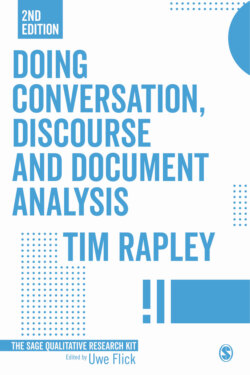Читать книгу Doing Conversation, Discourse and Document Analysis - Tim Rapley - Страница 19
На сайте Литреса книга снята с продажи.
Some practical considerations when working on documents
ОглавлениеGetting physical access to documents is important. One of the obvious starting places is to search on the Internet. You can often find some of the documents you need, or at the very least learn where you need to go to find them. There are now many web-based directories of specialized libraries, and their material might be available online.
Another solution is your nearest university or public library. You often find that they do not have exactly what you need. You then need to discover if this material can be ordered in from another library. This is not always a satisfactory solution, as some libraries will put restrictions on the number of documents you can request at any one time or you may not be able to order some of the material at all. Also, a lot of the time you may not know whether that article, that book or that magazine you have ordered is something you really need until you actually get to read it.
If your research is reasonably specialized, or is focused on historical documents, you will probably have to visit specialized libraries (often known as archives). In the UK, examples of these archives include The National Archives (official archive of the UK Government), The Women’s Library and the National Film and TV Archive. Some libraries’ collections have restricted access, which may mean you need to get some form of special permission to visit them. This permission can range from a letter from your supervisor or university to becoming an (honorary) member of that institution. Others may have open access. In the majority of the cases you will have to visit such specialist libraries in person.
You may also have restricted access to documents in other ways:
Although a huge volume of government documents are released and available for public scrutiny, some files are ‘closed’. This is especially the case with military and espionage reports, where documents may be closed and then only released into the public domain after a set number of years. And even when they are ‘opened’, some of the words may be obscured, some pages or whole files removed.
When documents have been produced for ‘internal’ consumption in an organization or between individuals, you will generally have some problems getting access to them. You may even have problems finding out that they exist at all! Obviously, to get access to such documents you will have to negotiate with the specific organization or individuals you are working with.
Depending on your focus, you may end up working with some documents that employ very technical or specialized language, abbreviations or conventions. However, during the course of your research, as you become more submerged in your field, you should hopefully become more familiar with the language that those who are already members of the area take for granted. In such cases, it may be possible to use a ‘technical’ dictionary to initially help you, or you may have access to an insider to provide relevant translations. Also, reading other accounts of the area, often written by other social scientists, can help you learn about the forms and routines of the language.
In some areas you will discover that a potential key document, or series of documents, will be written in a language you cannot read. You will need to search for an appropriate translation or ask about amongst your colleagues or friends to see if they can translate (part of) it for you. Prior to paying someone to translate a whole document – which is quite expensive – you really need to check whether that document will be central and what level of detail you need to work with. Do you need a word-for-word translation, will a brief summary suffice, or do you only need specific parts translated?
As you will (hopefully) be working quite closely on the documents, you really need copies of the original documents. When working with documents from libraries, as well as internal organizational documents, you will often not be allowed to take the original documents away from the building. With some documents, often due to age (and within organizations, potential sensitivity), you may not be able to photograph or photocopy any of the documents and so will only be able to make notes. Bear in mind you can only take so many notes or do so much verbatim copying by hand (or preferably onto a computer) in any one visit. Also, some libraries may have restrictions on both the number of documents you can request on each visit as well as the number of documents you can photocopy at any one time.
A final point is to remember to take detailed notes of where that document (or that specific quote) came from, whilst you are actually collecting the documents. Despite my good intentions, whilst writing up I usually find at least one document or quote that I have absolutely no idea where I got it from nor have any references for. Please try not to echo my mistake.
